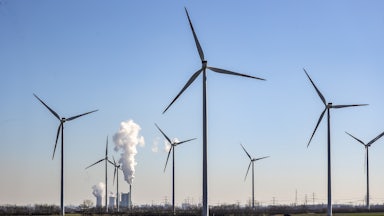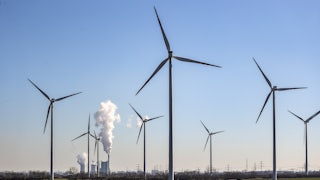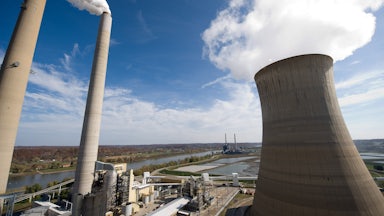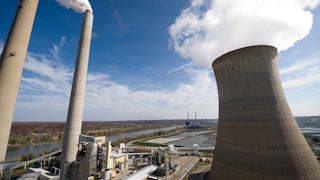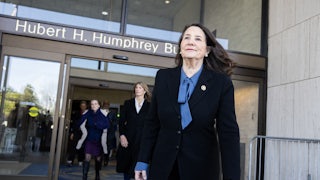Last night, Reuters reported that White House national climate adviser Gina McCarthy plans to step down from her post as the country’s de facto climate czar, a Cabinet-level position whose creation was seen as a win by activists. McCarthy, a former Environmental Protection Agency administrator, quickly denied that she had resigned, calling such reports “simply inaccurate.” That said, none of the reports from the last 24 hours suggest she has already tendered a resignation. Multiple sources who spoke to E&E News said she planned to leave in the next several months.
At least for now, McCarthy is sticking around. But there are more than a few reasons why someone whose entire job is to figure out how to enact climate policy in the United States might be exploring greener pastures—or at least less relentlessly frustrating ones.
In the past few weeks, the White House has signaled what might charitably be called a major vibe shift on climate. Virtually overnight the Biden administration pivoted from talk about passing historic climate measures through its Build Back Better Act to bringing down gas prices by any means necessary—ramping up domestic oil and gas production and exports to help Europe kick its addiction to Russian fuels. Its rhetorical strategy in doing so seems tailor-made to piss off all interested parties. As the administration accuses oil and gas companies of price-gouging at the pump, it is also begging them to produce more.
Progressives—including Representative Cori Bush—have urged Biden to treat the war in Ukraine as an opportunity to jump-start the transition off fossil fuels and use his extensive executive authorities to ramp up energy efficiency measures, along with clean energy deployment. Biden has instead mostly stopped talking about climate change altogether as he showers fossil fuel executives with even more subsidies to build polluting infrastructure that could stay online for decades to come. Days before the Intergovernmental Panel on Climate Change released a report showing that new fossil fuel development was plainly out of step with avoiding climate catastrophe, Biden called on Congress to pass legislation that would fine oil and gas companies for not drilling more aggressively.
Biden’s assumption here seems to be that domestic fossil fuel consumption will remain steady. That’s actually a pretty extreme position: As historian Gregory Brew pointed out recently in The Washington Post, even Richard Nixon and Gerald Ford looked to reduce demand for energy as they ramped up production to deal with rising prices and the energy crises of their time. The former imposed the first federal speed limits in 1974, boasting that “we can save nearly 200,000 barrels of fuel a day by observing a national limit of 55 miles an hour.” Yet what could have been a wartime footing to wean off foreign oil—or whatever patriotic framing the White House might have chosen—has mostly turned into a bonanza for fossil fuel companies, as stocks in liquefied natural gas firms, especially, soar.
Liberal Democrats are now rushing to subsidize oil consumption with rebates to drivers, and federal agencies are opening up new routes to subsidize companies directly. The Federal Energy Regulatory Commission has stepped back from recently proposed rules on greenhouse gas emissions for the fossil fuel infrastructure under its jurisdiction. On Thursday, the U.S. Export-Import Bank, or EXIM, unanimously approved a plan that could funnel public funds to liquefied natural gas companies in the form of loan guarantees, alongside support for semiconductor, biotech, and renewable energy manufacturing. As former EXIM chief strategy officer Luke Lindberg told The American Prospect’s Lee Harris, reporting on the agency’s new plan, EXIM could step in to help gas producers to whom private lenders are “not apt to loan a lot of dollars.” Compounding matters is the fact that even progressive Democrats in Congress have shown a willingness to hand Joe Manchin his wishlist of hydrocarbon booster policies in exchange for his support for the few remaining shreds of Biden’s Build Back Better agenda, i.e., about $500 billion worth of clean energy tax credits to be doled out over 10 years.
/ In honor of Earth Day, Apocalypse Soon content is free to registered users until April 29. Start reading now.
All that’s to say, the tools the White House is now using to boost fossil fuels are far more sweeping and creative than the tools they’ve been willing to use to transition to clean energy. To a brain in a jar concerned solely with partisan politics, that might seem fairly straightforward: There were obvious upsides to talking about climate change on the campaign trail, when Biden wanted to win over Bernie Sanders voters. But the prospects for legislation are slim to none, and the midterm elections are coming up fast. If Biden wants to appeal to voters, he needs to focus on the things they care about, gas prices and inflation chief among them. That might mean trading the support of constituencies and interest groups traditionally less likely to vote in midterm elections—young people and environmentalists—for more conservative middle-class swing voters who do. If that involves spewing a few hundred million more tons of carbon dioxide into the atmosphere, then so be it.
But for those still bound to the corporeal form—bodies that sweat in New York’s newly subtropical temperatures or that might develop rare cancers when exposed to the volatile organic compounds in fracking waste—that logic doesn’t quite cut it. With Democrats likely to lose the House in any case in the fall, and a Supreme Court poised to kneecap the EPA, this may be the last chance for at least a decade for the party to govern as if the climate matters. Instead, its leaders are showering fossil fuel companies with giveaways. Admirably, McCarthy has spent most of her career looking out for real, live people instead of the concerns of brains in jars. That’s certainly not the case for everyone in the White House, where various factions—including former fossil fuel executives—have battled for control over Biden’s agenda since day one. If McCarthy is indeed on her way out, it may be confirmation that her side has lost.



